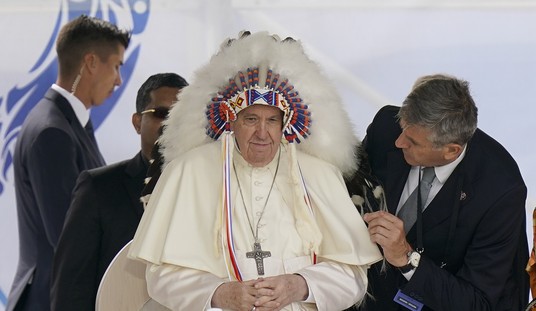Don’t bet on it, at least not in the sense of letting it go. Vladimir Putin requested and received the repeal of the Duma’s authorization to use military force in Ukraine, which Anna Nemtsova at the Daily Beast interpreted as waving a white flag. But was that a tactical retreat, or a strategic play?
Russia’s upper house of parliament voted Wednesday to revoke the right of President Vladimir Putin to use Russian troops in Ukraine, as efforts to calm a separatist uprising in Ukraine’s east continue.
The Federation Council had approved Putin’s request for a resolution allowing for the use of force on March 1.
But on Tuesday, the President sent a letter to the speaker of the upper house asking it to cancel the resolution. Only one senator voted against revoking the powers Wednesday, with 153 in favor.
Putin’s request was made in light of ongoing talks on how to settle the crisis in Ukraine’s eastern regions, said presidential spokesman Dmitry Peskov.
Nemtsova sees this as a response to Western sanctions, although concedes it might be something else entirely:
On Tuesday, a day after Putin and President Barack Obama discussed the conflict over the phone, Putin made a curious move in the Federation Council, the Russian senate. Only a few weeks ago, as Putin massed troops on the frontier with Ukraine, threatening imminent invasion, he asked the council to give him the authority to use the Russian military outside Russia’s borders. The world held its breath. War seemed imminent. But on Tuesday Putin asked the council to repeal the authority it had given him and on Wednesday it did just that.
Why would Putin want his hands tied (however loosely)?
One likely reason: He made the request a few days before European leaders are to discuss new sanctions against Russia, this time covering the banking sector. Another possibility: He can get the reversal reversed any time he wants, and may be trying, once again, to wrong-foot the West by talking conciliation while stepping up covert action to support the rebels in eastern Ukraine.
No doubt Putin wants to avoid sanctions if he can, but he’s already made it clear that he believes the West has as much to lose in that exchange as Russia. Putin, like most Russian leaders over the last couple of centuries, wants to divide the West and keep them squabbling amongst themselves. Some, like the French, are already refusing to cancel lucrative contracts with Moscow on behalf of Kyiv anyway. This concession is nothing to Putin, easily reversible if desired but hardly necessary to keep up the destabilization efforts in eastern Ukraine.
Events this week prove that much:
A cease-fire in eastern Ukraine appeared to break down Tuesday when a rebel attack on a military helicopter killed nine people and a separate assault killed two soldiers, even as Russian President Vladimir Putin took steps to support the country’s tenuous peace process. …
[B]oth sides traded accusations Tuesday that the other had violated the truce, and the downing of the helicopter near the rebel-held city of Slovyansk dashed hopes for peace a day after the warring parties held their first talks.
Ukrainian President Petro Poroshenko said in a statement after the helicopter downing that he may end the cease-fire early and that he had ordered military leaders to open fire in response to any attack. The truce is set to expire at 10 a.m. Friday.
Vladimir Seleznev, a Ukrainian military spokesman, said on his Facebook page that the Mi-8 helicopter was struck by a shoulder-fired missile shot from the village of Bylbasovka, just outside Slovyansk. The helicopter was delivering monitoring equipment, he said, and all nine people aboard were killed. Shelling at a checkpoint outside Slovyansk killed two soldiers, he said.
The Ukrainans aren’t fooled by Putin’s gesture:
“It’s only a symbolic gesture from him to support this peace process,” a senior Ukrainian security official said, speaking on the condition of anonymity because he was not authorized to talk to the news media. “I’d like to be optimistic, but I’m not,” he added, saying that he sees little reason for Putin to scale back what he said was a supply route of equipment to the rebels.
In fact, NATO Secretary-General Anders Fogh Rasmussen noted just last week that Russia was building up its forces on the border, not moving them away:
NATO Secretary-General Anders Fogh Rasmussen said Thursday (19 June) that at least a few thousand more Russian troops were now at Ukraine’s eastern border, a build-up he called a regrettable step backwards.
The Russian press wrote that Moscow could send troops to Ukraine to “encourage” government forces and separatists toward peace.
“We now see a new Russian military build-up around the Ukrainian border. At least a few thousand more Russian troops are now deployed,” Rasmussen said in London. “I consider this a very regrettable step backwards. It seems Russia keeps the option open to intervene further in Ukraine,” he said. “The international community would have to respond in a firm manner if Russia were to intervene further in Ukraine.”
Yesterday, Putin insisted that he would act to protect “ethnic Russians in Ukraine,” regardless of specific authorizations:
That doesn’t look like Putin’s waving a white flag — more like a red cape to the so-called “pro-Russian separatists” in eastern Ukraine.








Join the conversation as a VIP Member